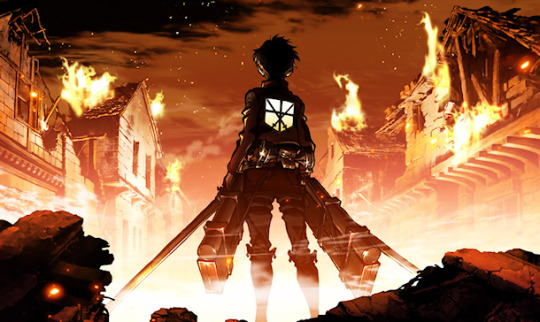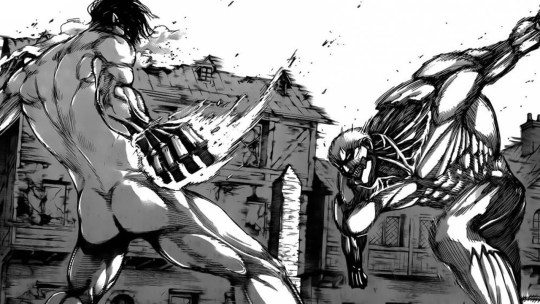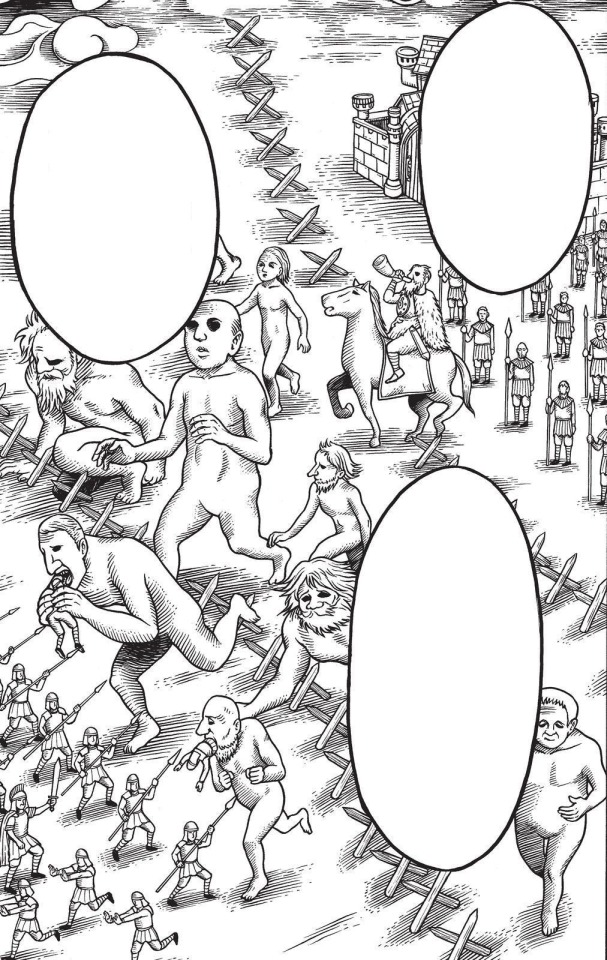#my suspension of disbelief is ruined by sudden betrayals like that
Text
all of BC, even Taiji and Kenta turning on ELP is bullshit, im so tired of Gedos booking
#my suspension of disbelief is ruined by sudden betrayals like that#you are gonna tell me taiji is gonna turn on a guy that has been nothing but good to him?#like if there would be at least a comflict in them to turn on phanta#but i guess that's asking too much for a bc storyline#faceturn be damned if i was elp id turn into a monsterheel to take revenge on bc#njpw spoilers#njpw spoiler#percht.txt#el phantasmo
25 notes
·
View notes
Text
The Ongoing Narrative Evolution of Attack on Titan

Hajime Isayama’s Attack on Titan (or Shingeki no Kyojin, if you’d like) is, at first blush, little more than a particularly smart and stylish take on the usual apocalyptic-horror formula: existentially-terrifying monsters in a world already lost, with a heap of unanswered questions. This conceit is ubiquitous these days; it’s at the core of hundreds of zombie and zombie-like apocalypse narratives scattered across a dozen different mediums.
How did world get into this mess? How does one survive in a world like this? Is it possible for society to survive in a situation like this? These questions form the backbone of fiction like Attack on Titan— internally within the narrative itself and externally in how the audience engages with it. One of the fundamental weaknesses of most zombie-like narratives is an inability to move past this core conceit and answer any of the questions. Few even try— as to do so might undermine much of the fundamental appeal of the narrative: the life-of-death tension and unknowable nature of the mystery.
Attempting to evolve the narrative past the status quo (no matter how unstable that status quo may logically be) runs the risk of alienating an audience who became engaged with the work because of that status quo in the first place. Oftentimes, the questions raised are far more interesting than the answers, and authors sometimes have no actual answer in mind when they ask these broad-sweeping questions in the first place. At the same time, maintaining a status quo indefinitely is boring; it’s at the core of why zombie fiction is so same-y and garbage.
One of the things that’s most remarkable to me about Attack on Titan is how it is not only willing to abandon the initial status quo, but continually evolve and develop the concept of the narrative while not betraying the themes and events it began with. It’s natural in a way that most apocalyptic monster stories aren’t. It continually raises more nuanced, challenging questions while answering older ones, and each new status quos raised is as perilous as the one that preceded it— just more complicated and nuanced.
Very little of what I’m talking about here is particularly revelatory if you’ve been keeping up with Attack on Titan, and if you haven’t been this discussion is going to amount to little more than the world’s strangest Cliffs Notes. I just want to nail down just how much Attack on Titan has been successfully evolving its themes while staying engaging, largely for my own satisfaction having just recently caught up. Spoilers for Attack on Titan through Chapter 98 after the break.
Much of Attack on Titan’s initial appeal came from its basic aesthetics. The imagery of sword-wielding techno-spider-men fighting giant naked man-eating men is at the core of why the anime was instantaneously popular, and why the manga blew up in the first place. But it’s fascinating how quickly it moved past being just that. In a way, Attack on Titan has undergone a continuous, evolutionary process— resulting in increasingly complex thematic phases that we can point to.
The initial premise was the simplest. The last remnant of humanity lives in a walled city that keeps horrible man-eating giants out. Life sucks. Then the titans breached the walls! The lead character, Eren, becomes an orphaned refugee after a titan eats his mother right in front of him, and enlists in the scout legion to try to get his home back, and get his revenge. But things suddenly turned in just a single volume’s time, when by a titan eats Eren… and inexplicably he transforms into an intelligent, sentient titan who wrestles the bad ones!
The immediate reaction by many to this twist was rather negative— which isn’t that surprising. After all, it seemingly undoes the base premise of the series, and forces another greater suspension of disbelief just after people had come to terms with Attack on Titan’s definition of “reality.” Isayama sold them a bill of goods that promised nasty naked boys eating spidermen; a sudden twist towards what first glance seemed to be rank power fantasy of “I AM THE NAKED GIANT BOY NOW, I SHALL DESTROY THE GRAVEYARD SMASH” was something of a ‘betrayal’ of the darker themes that had brought them in in the first place.
But those who gave this course change a chance discovered that rather than the narrative becoming simpler, it was WAY MORE COMPLICATED. Before Eren became a titan, we had no idea what the titans were, or where they came from. After he became a titan, we had even less of an idea, as the evidence we now had was so fragmentary and seemingly contractor as to defy most speculation. The general question of the setting (“How?”) became an outright mystery (“What!?”). What was the connection between humans and titans, and how the hell did Eren manage to turn into one and back again?
This turn also really kicked off what’s been a central aspect of Attack on Titan ever since: politics. The revelation of Eren’s ability was an incredibly political one; what was to be done with him, and what was the motivation of those now wanting him dead? The revelation that there was in fact a deeper connection between titans and humans suddenly brokered a great deal more suspicion in the actions of both the humans and the titans.

This paid off with the next major twist, when an expedition attempting to make use of Eren’s abilities was attacked by another titan that seemed to be under human control; others had the same ability as Eren! The narrative shifted from being “man vs monsters” to “man vs man, contextually monsters” as the titans took a role less as primary threat and more a backdrop for the conflict. That these “manned titans” seemed to be behind the deliberate compromising of the wall years previously resulted in a massive shift in the overall tone and nature of the mystery. The existential question was now less “Why is the world like this?” and more “Why would someone do this?” and “Who did this?”
The conflict was no longer us vs an inhuman them; who the enemy was no longer as clear. Who could Eren, and us by extension, trust? Those in charge seemed awfully like they knew way more than they let on, and it turned out that several of Eren’s compatriots from his training were the titan-changer sleeper agents, and were those who caused his family and thousands of others to die. But even stranger, these titan-changers in their midst impossibly came from some place outside the walls— which contradicted all we knew about the outside world.
But we had little time to dwell on this, as Eren and the scouting legion… initiated a coup de ’tat!? The government was quite clearly complicit in the state of things, willing to throw away millions of lives to maintain the precarious status quo and keep their hold on power. To do so, they attempted to seize Eren, triggering the coup. This finally moved the conflict to one purely “man vs man”, with the titans becoming little more than raison d'être. The coup ultimately culminated with the crowning of a new, more cooperative monarch, and the revelation that the nation’s isolation and regressive state was foisted upon it by its former rulers. We also began to learn more of the true nature of the titans: that they are created, that the power to become a titan can be transferred, and that it all somehow ties into the overthrown royal bloodline.
It seemed like oh so soon, we would be able to answer the ultimate mystery of the world. Eren gained his titan power thanks to a serum his father had given him right after the first wall collapsed, he seemingly having come from some place outside the walls just like the titan-changers. All the scouting legion needed to do now was take back the wall that had fallen all those years ago, and pull from its ruins the lost secrets of Eren’s father. Unfortunately, the titan-changers too knew of this goal, and it culminated in a pitched battle of titan versus titan and man versus titan, against those who had destroyed the wall.

The victory, at tremendous cost, brought the greatest revelations and shifts in the narrative of all: the conflict had always been one of man vs man. The walled nation that they thought was the last bastion of humanity? Little more than a single isolated kingdom, whose citizenry was of a seemingly cursed bloodline with the ability to transform into mindless titans— as well as to inherit the ability to become an intelligent titan. The titans hadn’t destroyed the rest of the world; they were amid an industrial revolution! The titans on the island were little more than dissidents from a beleaguered ethnic minority, transformed into monsters and released there as a last cruel insult to a nation that once ruled the world.
And now we truly see that nation at large. Those once oppressed by the titans now use them as weapons in World War I-era armed conflict, turning non-citizens kept in ghettoes into living weapons in an exploitative military machine. It’s far beyond the simple cruelty of man fighting monsters; true horror always belongs to the cruelty of mankind alone. Eren and his homeland don’t need to kill all the titans, or even defeat some narrowly-defined enemy; the world is their enemy. By their very birth, they are hated, used, and discarded. And how do you fight that? You can’t spiderman that away.
It seems their answer is to repay it in kind. Eren has infiltrated the home of those titan-changers who had once infiltrated his own. To what end? We don’t know yet. But I’m really fascinated to find out; it’s a total inversion of the concept we started with, and it took a hell of a ride to get here and have it feel like a natural extension.
19 notes
·
View notes